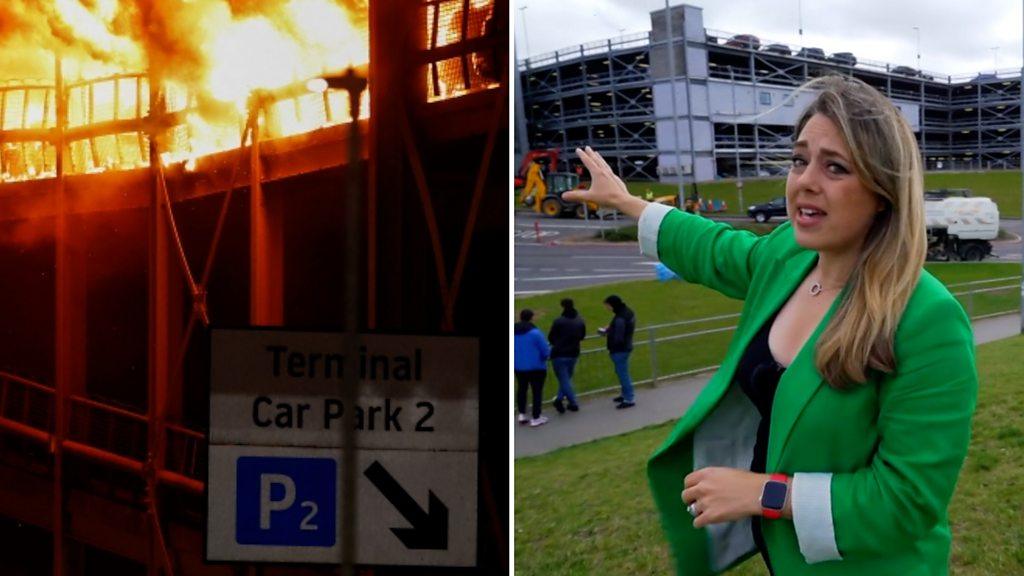Luton Airport: 'Car park fire turned my life upside down'
- Published

Andrew Miller believes he lost about £1,000 as a result of the fire at Luton Airport
Travel through Luton Airport now and passengers may spot the burned-out remnants of what used to be Terminal Car Park 2. The fire on 10 October grounded aircraft, disrupted the travel plans of thousands and trapped 1,300 vehicles inside. Six months on, as the demolition vehicles tear down the car park, the BBC asks what the impact of the fire was.
Andrew Miller had only had his car for two weeks when he lost it to the fire last year.
The 58-year-old wheelchair user had undertaken considerable research in order to find a vehicle which "was quite bespoke and precious to me and really was my independence".
At the time of the fire he was in Ireland and when he got back he said he "was really shocked" at how little information or support there was.
"I can't easily jump on a bus or a train as an alternative and we were utterly dependent on the kindness of the Luton Airport chaplain to get us home in the first instance."
Oli Jaycock, the director of corporate affairs at Luton Airport, said the airport was "sorry Mr Miller was disappointed with the support provided".
"The airport chaplaincy team are an integral part of the airport response to major incidents and, in Mr Miller's case, this included making arrangements for alternative transport to his home."
Archive: The BBC's Janine Machin shows us the aftermath of the Luton Airport car park fire
Mr Miller was "left in limbo", unable to get a courtesy car because his needs "were just so specific".
He spent about a month off the road before getting a new vehicle, missing work meetings and a funeral, saying it "really turned my life upside down".
He was one of tens of thousands of people affected, whether directly by having their vehicle in the car park, or indirectly by having flights suspended.
Last month a joint report by Bedfordshire's fire and police services said the blaze was "accidental", finding most probable cause of the fire was an electrical fault or a component failure in a moving diesel vehicle.
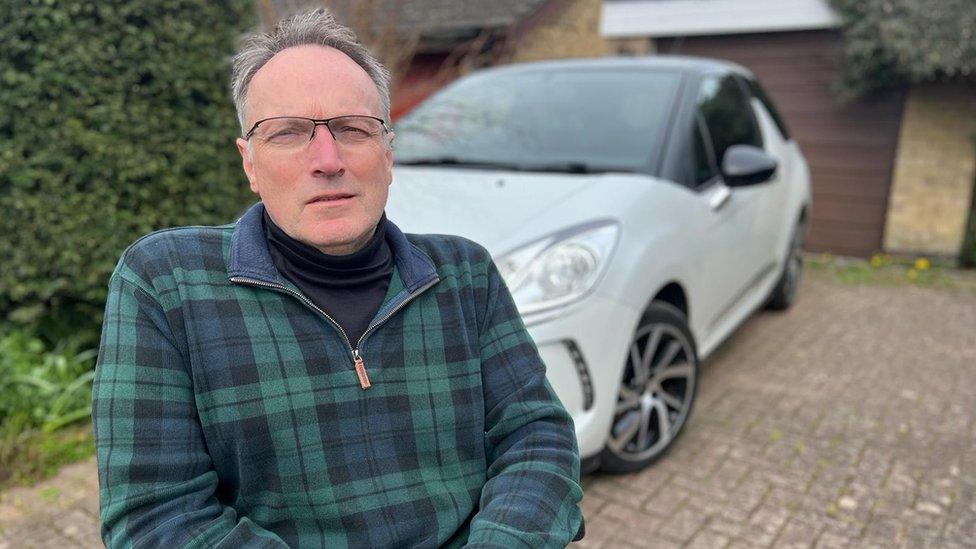
Mr Miller said he spent about a month off the road before getting a new vehicle
The car park itself was part of a multi-million pound modernisation programme, opening in 2019.
It was designed without sprinklers and at the time of the blaze Andy Hopkinson, the county's chief fire officer, said: "We are already talking to the airport about ensuring that any future, and the existing, car parks have sprinklers fitted... sprinklers may have made a positive impact on this incident."
Mr Jaycock said that the fire service was consulted when plans were submitted in 2017 and that it "made no recommendation as part of the building control consultation process".
He added: "The car park design fully met all fire and safety regulatory requirements."
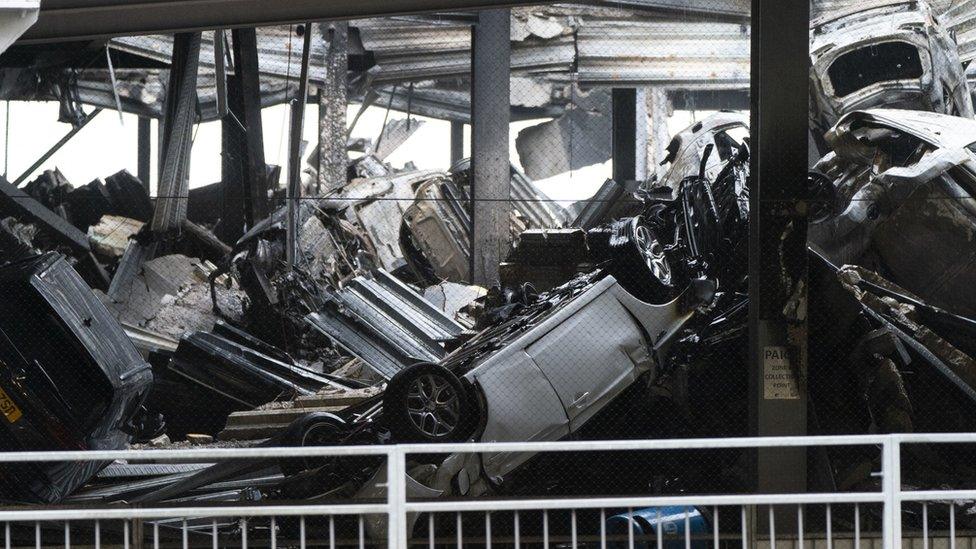
About 75% of the vehicles in the car park have been removed since the blaze
It was not the first time there was a major fire in one of England's car parks.
On New Year's Eve in 2017 flames engulfed one near the Liverpool Echo Arena, destroying more than 1,000 vehicles as temperatures reached 1,000C (1,832F).
Patrick Hayes, the technical director at The Institution of Structural Engineers, said following the fire Merseyside Fire Service recommended sprinklers in modern car parks.
He added that his institution had issued a number of reports on the risks modern cars possess, and recommended the "fire resistance" - the period a car park structure can remain stable in the event of a fire - be raised from 15 minutes to between 30 minutes to 120 minutes.
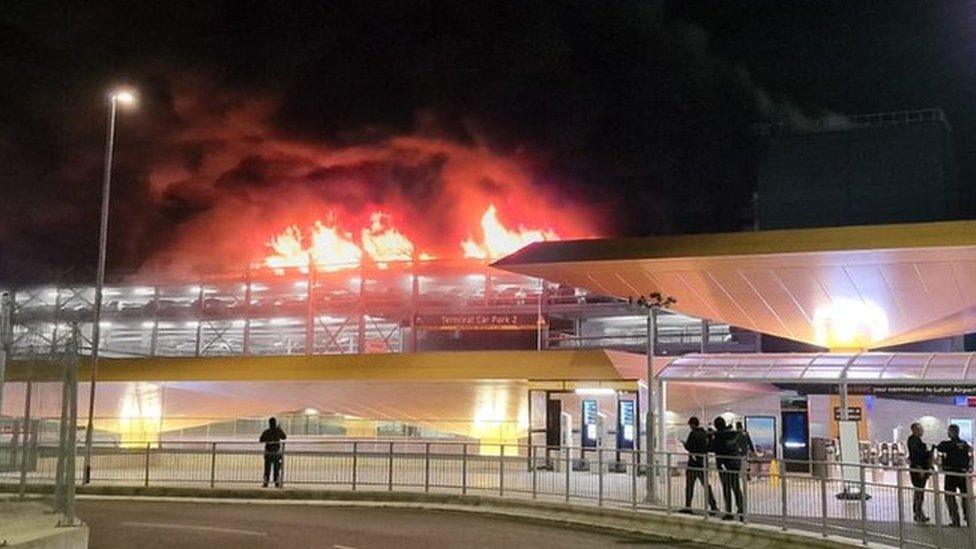
A full report by the fire service is expected in September
Mr Hayes said "modern cars are heavier than some of the car parks have been designed for and also more flammable because they contain more plastic", while there are different fire risks posed by electric vehicles.
He said: "Originally the guidance around car park design... was based on the assumption that the fire wouldn't spread beyond one or two vehicles.
"What we see with modern vehicles, because they are larger so they get parked closer together and they're more flammable, is that the fire can spread towards several vehicles. So it's not as contained a fire."
Mr Hayes said for existing car park structures he "would promote a risk assessment approach, so looking at the potential fire risk of cars in those car parks and adding sprinklers where required to reduce that risk down to an acceptable level or managing that risk in another way, be that monitoring or alarms or even where cars park".
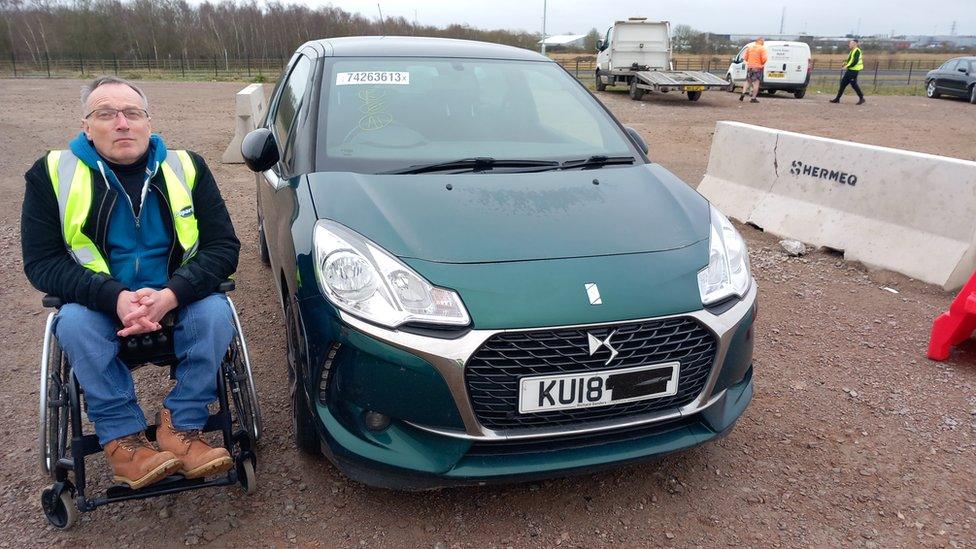
The 58-year-old was recently reunited with his old car at a salvage yard
For Mr Miller, he said: "The Luton car park was designed and built two years after the Liverpool fire and really, I would like to see MPs legislate to ensure multi-storey car parks are fitted with appropriate fire prevention measures and sprinklers systems.
"It's extraordinary to me that the car park builders and operators at Luton didn't adopt any learning from Liverpool or other car park fires.
"I think that has got to change to ensure no-one else has to go through this awful experience, because I think it's certainly clear that there will be another fire in a similar kind of structure, more people will be put through this misery and of course, the threat to life.
"We have to thank our lucky stars that in neither Luton or Liverpool there was any injury or death."
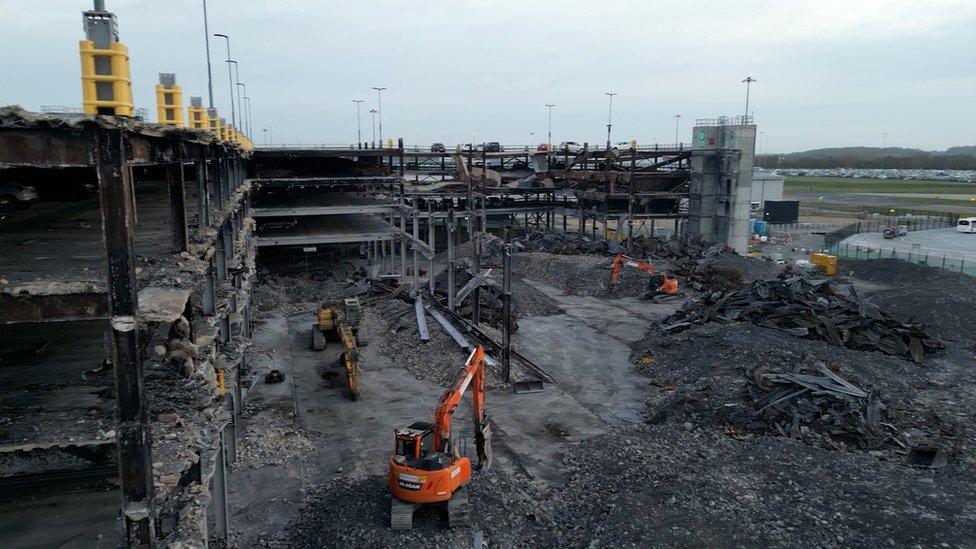
Luton Airport said about 790 tonnes of metal had been recycled
A spokesperson from the Department for Levelling Up, Housing and Communities said: "Public safety is our absolute priority - which is why we're undertaking a major review of the fire safety guidance to the building regulations, including research on the fire resistance of car parks."
Luton Airport said its replacement car park - due to be completed in late 2025 - would "incorporate a fire suppressant system".
Mr Jaycock said: "Despite the size and scale of the fire, our robust emergency procedures ensured that no customers were injured and our teams worked tirelessly to ensure passengers and car park customers were supported and updated throughout.
"This included working closely with the car park operator, APCOA, to respond to almost 16,500 customer queries."
An APCOA spokesperson said: "APCOA supports the response that London Luton Airport has provided.
"Our teams worked tirelessly together during and after the fire to ensure customer safety and service.
"This included assisting customers on the ground, providing updates via multiple channels, and responding to an unprecedented number of customer inquires."
Mr Miller - who believes he lost somewhere in the region of £1,000 as a result of the fire - was recently reunited with his old car on a "vast salvage yard", with it brought to him on a forklift.
It appeared "relatively unscathed" and he suspects it was "perfectly driveable" - there were even some unmelted chocolate bars inside.

Got a story? Email eastinvestigationsteam@bbc.co.uk, external or WhatsApp 0800 169 1830. Follow East of England news on Facebook, external, Instagram, external and X, external.
Related topics
- Published3 April 2024

- Published21 March 2024

- Published20 March 2024

- Published11 October 2023
